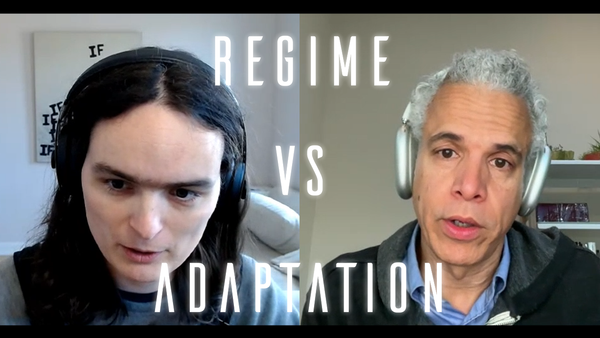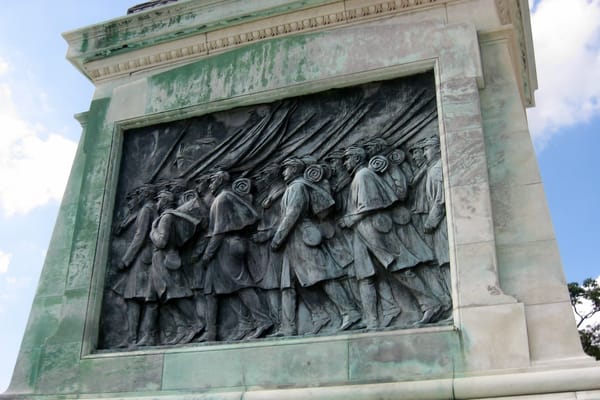White Fragility Comes to the Naval Academy
Treating America’s soldiers and sailors like scared children, too delicate to read a history of lynching, shows the administration’s deep contempt for them.

The Trump administration hopes to impose intellectual conformity on the nation’s military academies. At West Point, syllabi have been reviewed to ensure they are congruent with the administration’s ideology, classes on race and gender have been canceled, and the sociology major was dissolved. The New York Times reported that the United States Naval Academy removed 381 books in response to what the media insists on calling the Trump administration’s targeting of Diversity, Equity, and Inclusion (DEI), but what is, in reality, a set of segregationist policies designed to undermine Civil Rights Era gains. The Executive Order on which this censorship is based was designed to target K-12 education, but Defense Secretary Pete Hegseth applied it to the military academies.
I’ve collaborated with several authors on the banned book list, including Dr. Eduardo Bonilla-Silva, one of my graduate advisors, and Dr. Tsedale Melaku. My work on racialized organizations, which makes the case that mainstream organizations tend to reinforce structural racism, was included in a banned anthology that Dr. Melaku co-edited with Angie Beeman and Christoph Winkler. Beyond collaborations, I consider many of the banned authors friends, comrades, and intellectual co-conspirators.
Dr. Crystal Fleming’s irreverent and hilarious book made me less stupid about race. Dr. James Lowen became one of my academic heroes by exposing the lies saturating my elementary school education. These banned intellectuals’ words echo in my head as I write, clarifying my understanding of the ways that racism warps the polity. Aspiring race scholars would do well to use this list as a draft syllabus or in preparation for a qualifying exam.
Authoritarians are threatened by brilliance, so lots of brilliant work is on this banned list. Hannah Arendt captured this dynamic in a quote I’ve seen rocketing around social media since Trump nominated noted drunkard and Fox News personality Pete Hegseth for Secretary of Defense. Arendt wrote, “Totalitarianism in power invariably replaces all first-rate talents, regardless of their sympathies, with those crackpots and fools whose lack of intelligence and creativity is still the best guarantee of their loyalty.” Once in command, Arendt’s crackpots and fools suppress information exposing their relative worthlessness. Hegseth bans books that condemn the favoritism and racist double standards responsible for his promotion. In other words, these censors are fragile.
So it was darkly funny to me when I noticed Hegseth banned Robin DiAngelo’s White Fragility: Why it’s So Hard for White People to Talk About Racism, because the ban so neatly confirms DiAngelo’s straightforward thesis. Learning basic facts about racial inequality in the United States—that the Civil War was indeed about slavery, or that northern white racists also hated Dr. King’s message—emotionally unsettles some white people.
Unable to control their hypersensitivity, these fragile white folks respond to discomfiting knowledge with an ignorant and incoherent rage, lashing out in the hopes that bluster and aggression will be mistaken for the strength they lack. Unable to deal with the well-documented reality of historical and contemporary structural racism, they defensively conjure a white supremacist fantasy world. Defense Secretary Hegseth hopes to project American military strength by making the Navy’s library a safe space for white ignorance.
Readers may find it surprising that I’m defending White Fragility, and I assure you I am also surprised. It is undoubtedly a flawed book, and it came in for criticism across the political spectrum. Critics on the left faulted its overly psychological account, which glosses over racial capitalism and the economic benefits racism brings to a small minority of whites while dividing the working classes. According to this camp, ignoring racial capitalism made DiAngelo’s message palatable to book-buying white liberals, the type who would be willing to send a book to the top of bestseller charts as long as it could serve as a signal that they held the right attitudes.
Right-wing critiques of White Fragility were less coherent but ultimately more successful in effecting political change, as activists made DiAngelo a personal target during the anti-Critical Race Theory moral panic. Here, DiAngelo largely served as a blank screen upon which various conspiracies were projected, including the notion that teaching white kids about their country's history is reverse racism.
Despite its flaws, like stopped clocks and Bill Kristol, White Fragility is occasionally right. So, while I don’t offer a full-throated defense of some of the book’s claims, when the Secretary of Defense thinks America’s service members are too soft to deal with Maya Angelou’s I Know Why the Caged Bird Sings but keeps Hitler on the library shelves, it’s safe to conclude DiAngelo was on to something. It can charitably be described as fragile when one of the most powerful men in the country, in control of what they consider the “most lethal” military in history, has a temper tantrum over learning that the criminal justice system is racist.
Beyond its moral repugnance, banning books about race and gender harms the military’s mission. I first started thinking about race and organizations during my dissertation research on the military, an organization that is a rare integration success story. Sociologists typically see the military as better on race than many workplaces, claiming that their strong commitment to skills-based promotion should serve as a model for civilian organizations.
They desegregated earlier than many schools and corporations, and military leaders recognize that diversity contributes to force-readiness. Black people are over-represented in the military, in part because it serves as a buffer against discrimination in the civilian labor market. Even the Supreme Court’s notorious hostility to race-conscious policy stopped at the military academies, which were exempted from affirmative action bans because the Court recognized that a diverse military leadership is a national security imperative. Of course, discrimination and unequal outcomes still exist in the military, but often at a lesser magnitude than in other organizations. In other words, Hegseth is breaking something that was, relative to civilian life, fixed.
The notion that liberals and the left look down on the military is a staple of right-wing propaganda. But treating America’s soldiers and sailors like scared children, too delicate to read a history of lynching, shows the administration’s deep contempt for them. Banning books is insulting because it implies that censors know best and that people can’t be trusted to understand and evaluate information. Applying a K-12 book ban to an organization of adults deepens the insult further. For Hegseth, a willingness to put one’s body in harm’s way for the nation is not enough: he hopes to control the very thoughts of the people lower down the military hierarchy.
Featured image is Banning Books Bans Freedom, by Emily Harrison




